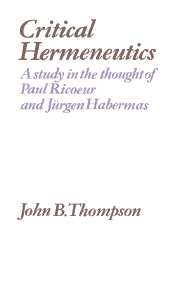Summary
In the preceding chapters, I have explored the contributions to the philosophy of social science which may be found in the writings of authors belonging to different intellectual traditions. This comparative analysis is invited and facilitated by a remarkable feature of twentieth-century thought: its convergence on the phenomenon of language. Like philosophers in the Anglo-Saxon world, both Ricoeur and Habermas emphasise the centrality and importance of language. Yet unlike many of their Anglo-Saxon counterparts, neither Ricoeur nor Habermas regards the analysis of this phenomenon as an activity divorced from broader philosophical and theoretical concerns. Thus Ricoeur views language as a medium of objectification and assigns hermeneutics the task of unfolding the dimensions of being which are expressed in, and disclosed by, the semantic structure of symbols and texts. Habermas conceives of language as the locus of ideology, suggesting that the distortions effected by the exercise of power can be criticised through a reconstruction of the presuppositions of speech. So for authors within widely differing traditions, language has become a common field of analysis, a common intersection for divergent aims. However, whereas ordinary language philosophers tend to treat this field as the ultimate ground of inquiry, both Ricoeur and Habermas view it as a region through which interpretation must proceed, but which in the end it must surpass.
The conceptions of language espoused by Ricoeur and Habermas are interwoven with their approach to the social sciences.
- Type
- Chapter
- Information
- Critical HermeneuticsA Study in the Thought of Paul Ricoeur and Jürgen Habermas, pp. 214 - 218Publisher: Cambridge University PressPrint publication year: 1981



